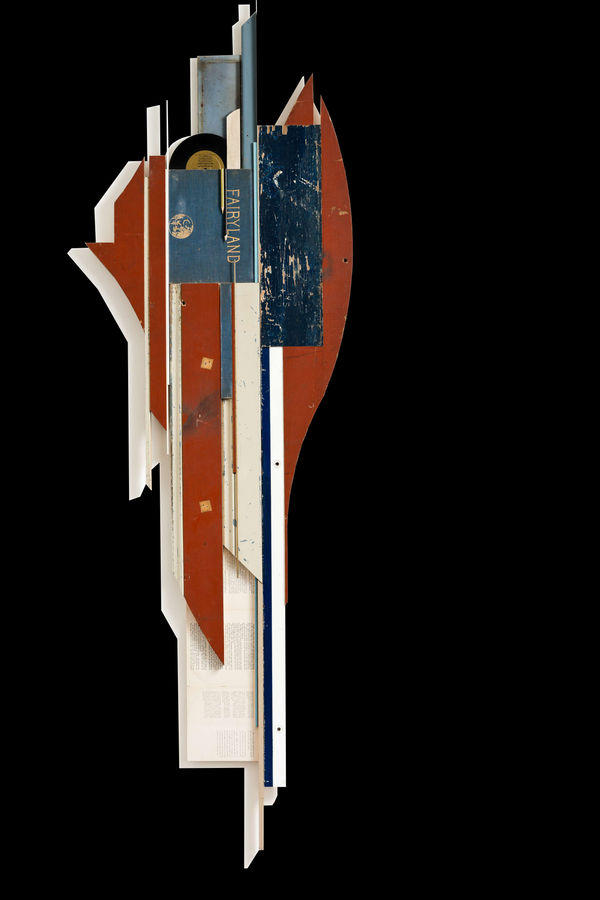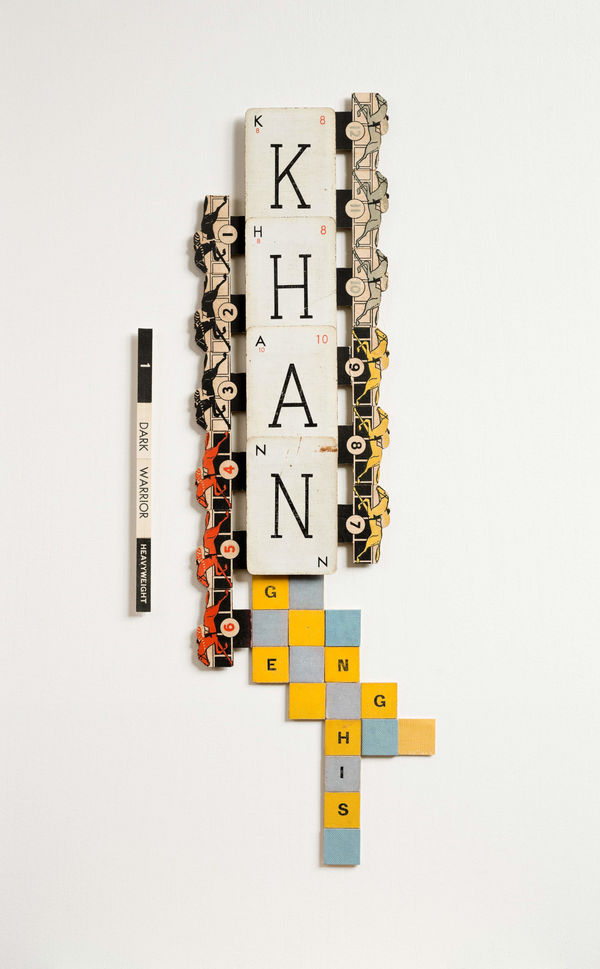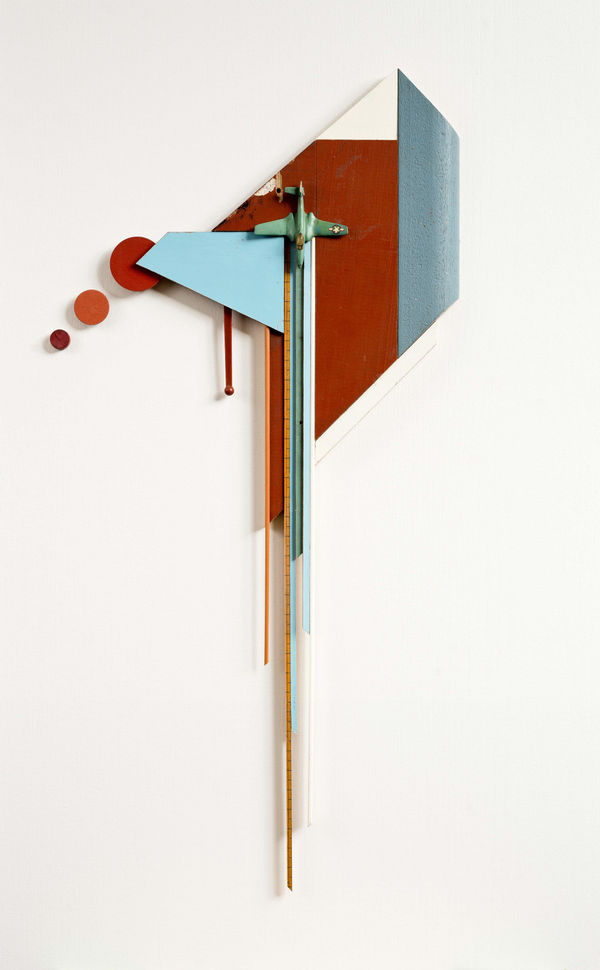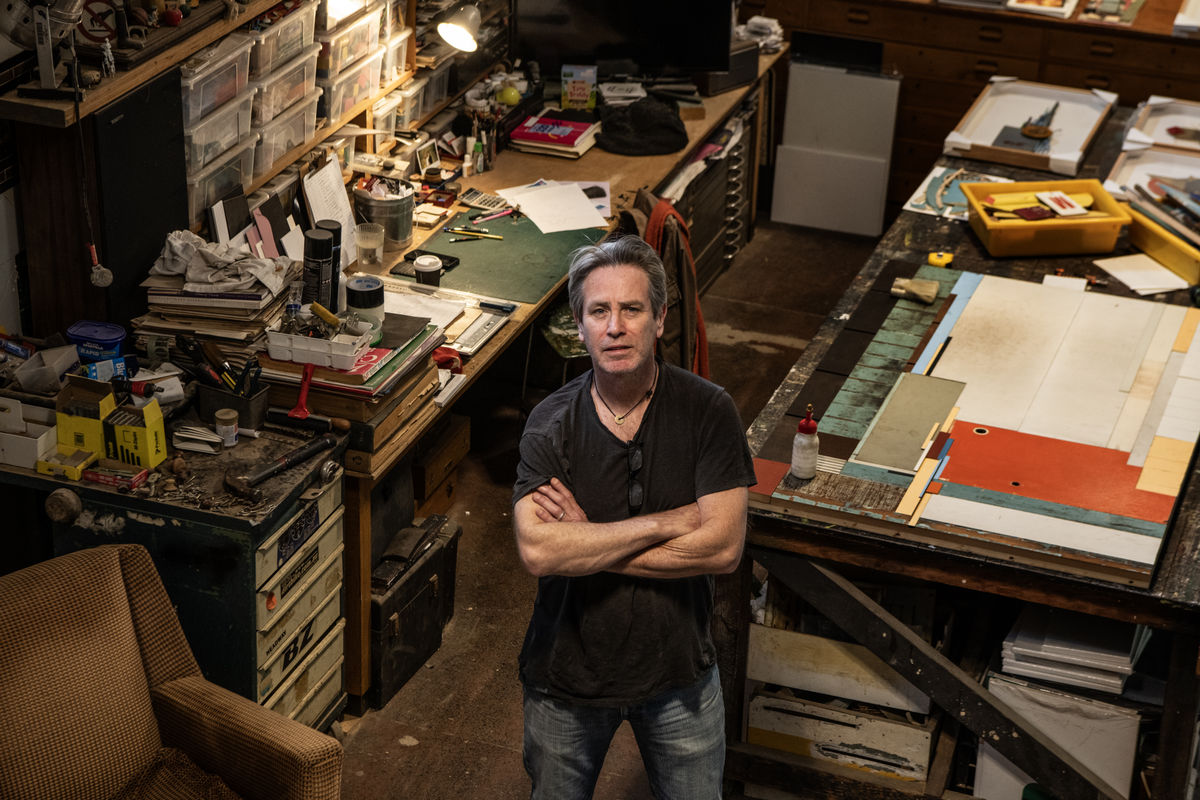Empire Fall: James Powditch
-
-
Opening Drinks
THURSDAY 24 JULY, 6 – 8PMEmpire is a recurring condition of the human spirit. It reflects our most primal urges—ownership, control, enrichment—gathered under the seductive banner of strength. Rather than knowing boundaries, an empire requires the continual pushing of them. In truth, the one enduring certainty of the contemporary world is that the idea of empire—in all its evolving forms—remains the essential driver behind our systems, ideologies, and mythology.
-
Ralph Hobbs
JULY, 2025
To enter James Powditch’s studio feels less like stepping into a workspace and more like descending into a contemporary catacomb—layer upon layer of material fastidiously catalogued on the overflowing shelves. It represents the flotsam of our world, washed up on the rocks of contemporary society and assigned new meaning by a master chronicler and salvager of the symbols that have inherently made us. Empire Fall is an exhibition that takes a long view of history through a contemporary lens. The artist transforms patinated fragments—industrial offcuts, obsolete signage, cultural refuse—into elevated, animated edifices that challenge us to truly look at history, not merely what’s purported to be history.
Since the beginning of recorded time, the world—and humanity’s place within it—has been strewn with the detritus of empire. From the ancient city-states of Babylon to the jungle temple-states of Central America, and on to the omnipresent Eastern and Western hegemonies—empires have risen and fallen, each dominating its corner of the world in its time. The legacy of empire explains much about how and why the world functions as it does today—and, importantly, gestures toward what may come.
Empire is a recurring condition of the human spirit. It reflects our most primal urges—ownership, control, enrichment—gathered under the seductive banner of strength. Rather than knowing boundaries, an empire requires the continual pushing of them. In truth, the one enduring certainty of the contemporary world is that the idea of empire—in all its evolving forms—remains the essential driver behind our systems, ideologies, and mythology.
Consider the Roman Empire, the archetype of imperial reach. Emerging from a constellation of rivals around 300 BC, it took centuries to build and eventually came to dominate the known world. Long before the Caesars ruled, the machinery of empire was already in motion. Its slow decline gave way to a spiritual successor: the Holy Roman Church—St Peter’s Basilica rising from the blood-stained marble of the Colosseum. In turn, the Church built an empire of faith that continues to this day. Empires do not simply vanish; they morph, rebrand, and resurface under new banners. One thing is certain: every empire will fall—only to be absorbed into the next iteration of humanity’s eternal push for dominance.
When viewing Powditch’s work, we are reminded of Vladimir Tatlin, the Russian constructivist who created a new visual language to reflect the workers’ utopia of revolutionary Russia. Tatlin’s practice had a physicality that channelled the ideological energy of an emerging power. So too with Powditch’s materiality: using the past to inform the future underpins the enormity of his conversation. History repeats, collapses, and repeats again. Empire Fall is both a title and a warning. Powditch’s work does not offer easy answers but instead poses one vital challenge: can we, in our collective wisdom, forge an empire based on truth with a truly humane manifesto?
Opening Drinks: Thursday, 24 July, 6 - 8pm
Artist Talk: Saturday 2 August, 2 - 3pm RSVP HERE -
Works
-
 James PowditchAlice, (Great Britain), 2025Mixed media66 x 42cm box framedSold
James PowditchAlice, (Great Britain), 2025Mixed media66 x 42cm box framedSold -
 James PowditchCamelot, (USA), 2025Mixed media, unframed201 x 63cmSold
James PowditchCamelot, (USA), 2025Mixed media, unframed201 x 63cmSold -
 James PowditchCatch 22, (Roma), 2025Mixed media66 x 42cm box framedSold
James PowditchCatch 22, (Roma), 2025Mixed media66 x 42cm box framedSold -
 James PowditchCarnation Revolution, (Portugal), 2025Mixed media66 x 42cm box framedSold
James PowditchCarnation Revolution, (Portugal), 2025Mixed media66 x 42cm box framedSold -

-
 James PowditchCheckpoint Charlie, (Germany), 2025Mixed media92 x 62cm Box framedSold
James PowditchCheckpoint Charlie, (Germany), 2025Mixed media92 x 62cm Box framedSold -

-
 James PowditchDēmokratia, (Greece), 2025Mixed media92 x 62cm Box framedSold
James PowditchDēmokratia, (Greece), 2025Mixed media92 x 62cm Box framedSold -

-

-
 James PowditchGuns, Germs and Steel, (Spain), 2025Mixed media66 x 42cm box framedSold
James PowditchGuns, Germs and Steel, (Spain), 2025Mixed media66 x 42cm box framedSold -
 James PowditchHakucho, (Japan), 2025Mixed media66 x 42cm box framedSold
James PowditchHakucho, (Japan), 2025Mixed media66 x 42cm box framedSold -

-

-

-
 James PowditchMiddle Kingdom, (Egypt), 2025Mixed media92 x 62cm Box framedSold
James PowditchMiddle Kingdom, (Egypt), 2025Mixed media92 x 62cm Box framedSold -

-

-

-

-

-

-

-

-
-
News


























